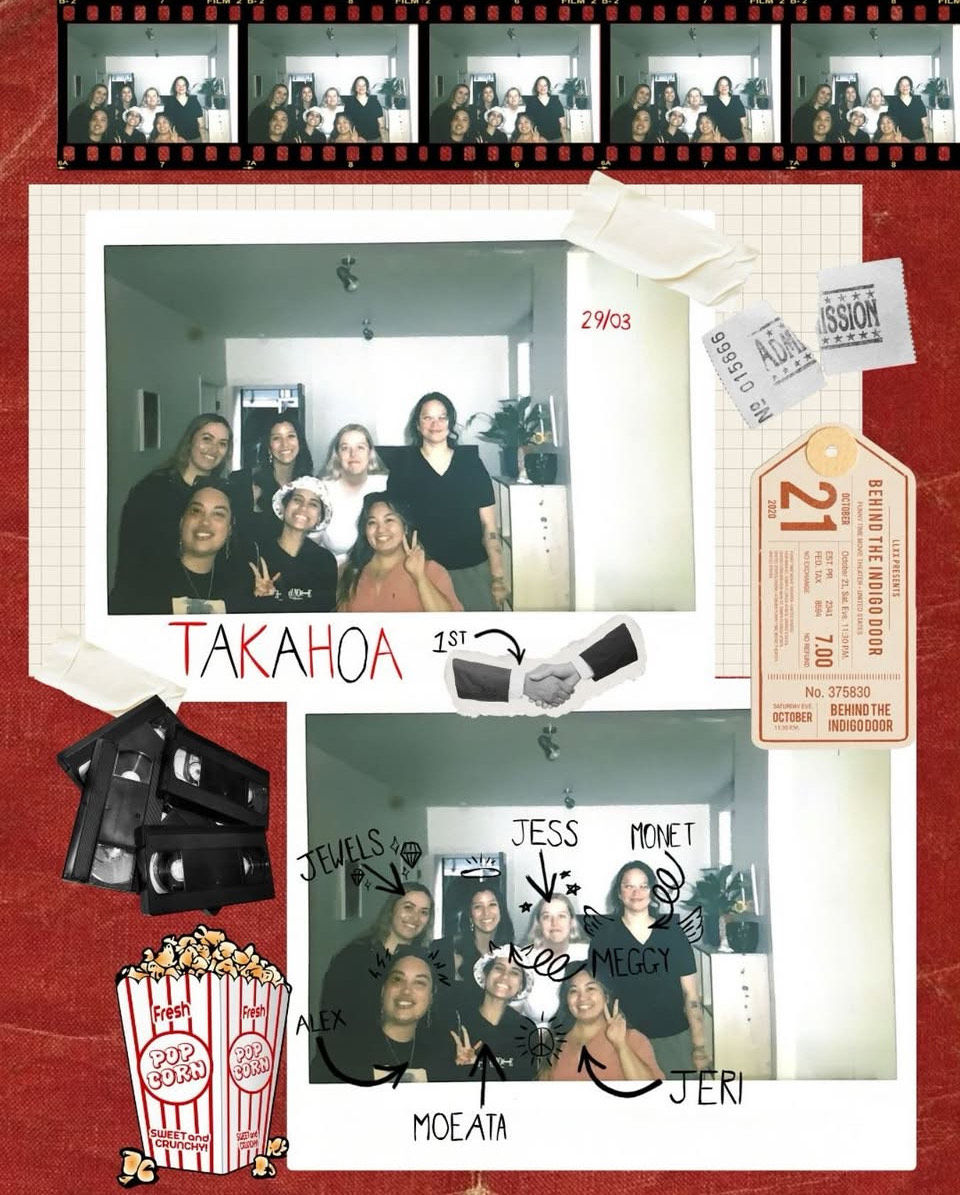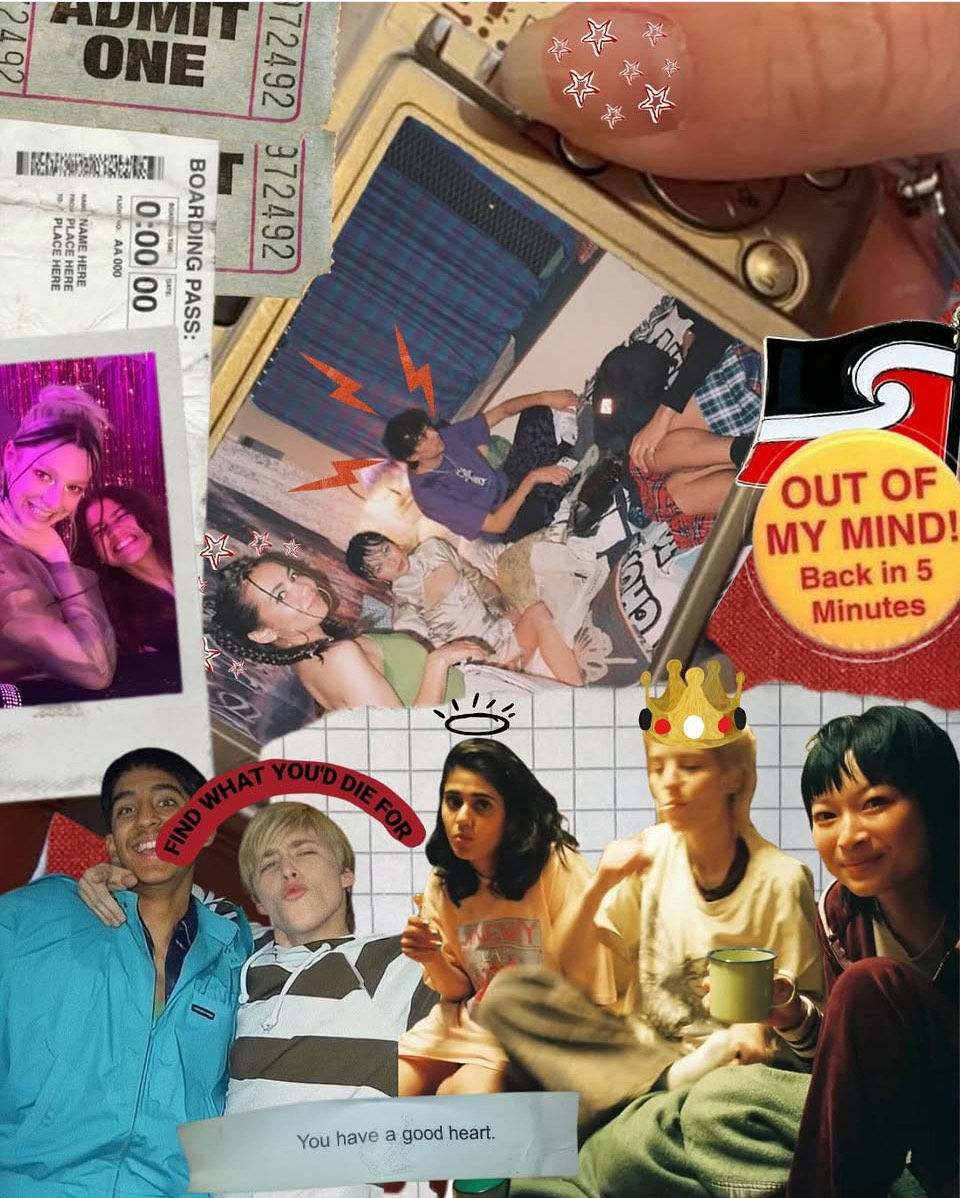Talking TAKAHOA: A coming-of-age mini-series rooted in the exploration of Māori identity
- Vik Sazhina
- Jul 21, 2025
- 6 min read
INTERVIEW | ENTERTAINMENT | ARTS | MATARIKI
Written by Vik Sazhina (she/they) | @vik.sazhina | Contributing Writer
TAKAHOA, an upcoming five-part YouTube mini series following five childhood friends, is promising to be a compelling exploration of Māori identity in your 20s and the importance of community and friendship. Set locally in Tāmaki Makaurau, New Zealand, co-creators Monet Bailey-Ngatai and Jess Sewell share their journey from the roots of Overwhelmed Productions to finding a community of their own, seeking to represent several up-and-coming Aotearoa creatives through the show.

What inspired TAKAHOA, and how did Overwhelmed Productions come to be?
Jess: So, we originally were writing a show called ‘Overwhelmed’ and then it was a lot bigger scale. So, we ended with like pretty much deciding to do something a little bit smaller, and then we were like, “We need a production company.” Long story short, we called it Overwhelmed Productions based off of the original idea that we had, and then one day, Monet had an idea to do like a web series, or a mini series.
Monet: Well, we found a producer for our original idea, and she was the one who suggested we do something a bit smaller. And then we’re like, “Okay, let’s think about that.” And then, yeah, we came up with an idea, and then, yeah, just started. I was doing a business course to help, because we worked for my mum to help with her business, and Jess was like, “Why don’t you like, put this on if we had a production company?” and I was like, “Okay.” And then since then it’s just been like full speed ahead.
Jess: Yeah, it’s been a lot.
Why did you decide to specifically tap into the coming-of-age genre?
Monet: We love it.
Jess: Yeah, we love it and only just really recently lived it, so we’re kind of just writing about what we know. We’re both 25, so we’re pretty much like just writing on our experience of how we felt when we moved to Auckland, cause we’re both from very small towns. Monet’s from Waitara, and I’m from Napier, and we moved here pretty much around 19, 20-ish.
It’s pretty much just based on that experience.
Monet: There’s a lot of like youth dramas in New Zealand, but they don’t really resonate with us. So because of that, we were kind of like, “Oh, let’s try to make something that would resonate with us, and we know what resonates with us cause we are-
Jess: We are in that age group, we are those people.
Could you guys briefly introduce your characters and the role they play within the story?
Monet: TAKAHOA is about five friends who have been together since childhood, and now they’re in their 20s. Attending Uni, out working or just, you know, figuring out what they want to do for the rest of their lives. Four of them live together in a shared flat, with their other best friend Alice, who lives separately from them in the city. They’re all navigating what it means to be an adult, like finding what their purpose is. Our first season is centred around Hana, who is Māori-Pākehā and a visual artist. She’s always been quite avoidant of her Māori heritage, and when she submits her piece to an art gallery and gets second place to someone who does more traditional Māori style of art. One of her best friends, Marley, who’s the only Pākehā girl in the group, calls the winner a ‘diversity win’ to make Hana feel better. But that’s obviously not how -
Jess: Not the right thing to say.
Monet: No, and Anahera overhears that, the girl who won, and confronts Hana about standing up for her culture, or for other Māori, and for letting her friends talk about that in her space. That experience makes Hana reflect on why she feels the way she does about being Māori and inspires this journey into her identity.
Jess: Yeah, and I feel like for you [Monet], you were writing from a personal experience.
Monet: Well, because I’m Māori-Pākehā, I was always very averse. I never felt like I was white enough to be a white girl, and never brown enough to be a brown girl. So, it was always like I don’t even wanna acknowledge being Māori, cause that’s what I have like control over, and no one can tell me anything. It took me a really long time to kind of feel comfortable talking about it, and with this project especially, I’ve really had to look into those feelings.
Jess: You had to confront it head-on in front of a whole bunch of other people.
Monet: Yeah, it’s been good for me, a good exercise.

So with that, what kind of messages are you hoping to send, especially to your Māori-Pākehā audiences?
Monet: There is no such thing as being not Māori enough, cause you’re just Māori and that’s it. You don’t have to do things or be a certain way to prove yourself as a Māori. Just embrace who you are, that’s what it’s all about.
What was it like surpassing your monetary goals and receiving such overwhelming support for TAKAHOA online?
Jess: It was awesome and unexpected, cause I think because with Boosted in the first week it kind of goes full steam ahead and they’re donating, and then in the middle two weeks, in week two to three, is when it sort of dies down. So, we have to push out more story-related stuff for the audience to keep them engaged and keep wanting to support the project. And then in the last week, it picked up again. So, I think in week three is when my hopes kind of got down a bit, and I was like, “I don’t think we’re gonna be able to do it.” And then in week four, we got accepted to the Rule Foundation. They gave us a grant that went in, and then we got to match donors, and then that kind of just picked up the speed again, and yeah, it started to feel more real.
Monet: We had people donating in the last 10 minutes. Like I swear, they were only doing it cause they wanted us to have an uneven number. And then Jess was like, she put the last-
Jess: I was the very last donation, because I was like, “It needs to be an even number.”
Did you ever imagine that it would take off like that?
Monet: No.
Jess: I did not expect the stretch goal to even be a thing.
Monet: Well, we were like surprised right from the beginning, we’ve been constantly surprised about how well-received our project has been. Like, when we first put an ad out on Instagram for a cast and crew, we didn’t expect anything. And then the next thing we know, we have 20 people in our house doing auditions. And we were like, “This is crazy!”, and it just keeps getting crazier.
Jess: Yeah, now we have about 25 cast and crew, which is insane.
So, what are the next steps for you guys?
Monet: Shoot the shot.
Jess: Yep. We need to nail down pre-production. We’re really getting into the busy stage. We’re finalising the budget and all that sort of stuff.
Monet: We were like, “After the crowdfund, we’ll have a little moment to breathe.” Never.
Jess: There is no moment.
Monet: Yeah, so we’re shooting at the end of this month, and then we plan to distribute on YouTube at the end of August, and we’re going to do it weekly. So keep an eye out for us on YouTube over at @overwhelmedproductions.
Anything else to add on TAKAHOA?
Monet: I think it’s worth talking about how our kaupapa for this project is to uplift and showcase emerging creatives in the industry.
Jess: Especially in New Zealand.
Monet: Yeah, especially Aotearoa creatives, because we are 25, and all of our crew and cast are around our age.
Jess: Around 20-ish.
Monet: Yeah, and still in that age bracket, and they’re all quite like you know - we’re based on vibes, we judge based on that. We don’t even know what they do for their actual job, in the interview, we’re just like, “What’s your favourite movie?” And then we have like callouts on our Instagram for Aotearoa-based musicians, visual artists, fashion designers, and we’re just trying to like build a community. We can see how we can help them out, how they can help us out, how we can all just support each other, showcase each other, and, ultimately, be there for each other.
Through TAKAHOA, Monet and Jess strive for authentic and diverse cultural, youth and queer representation that depicts real stories based on real-life experiences. Keep up to date with their progress on their Instagram and YouTube @overwhelmedproductions for more information on the release of the show.





Comments